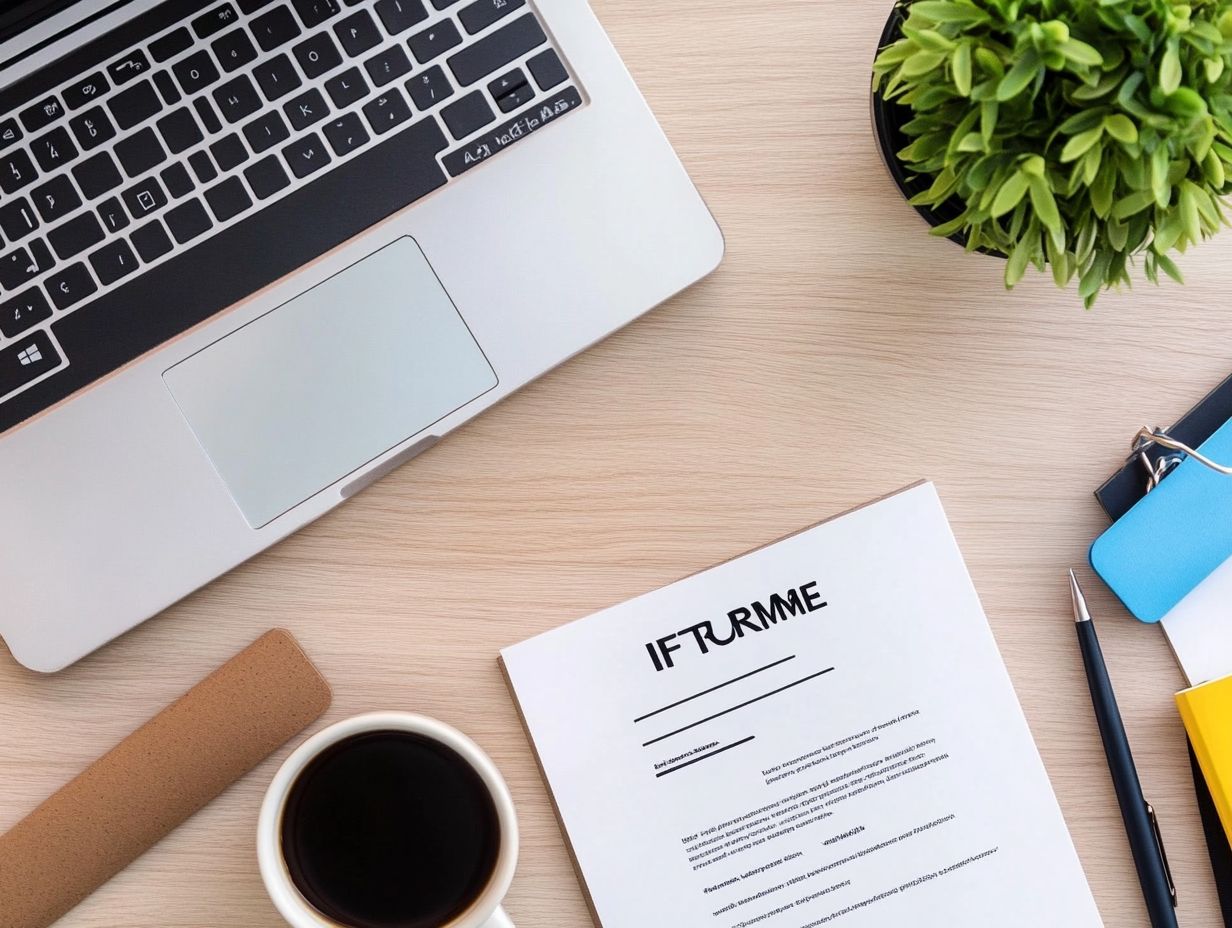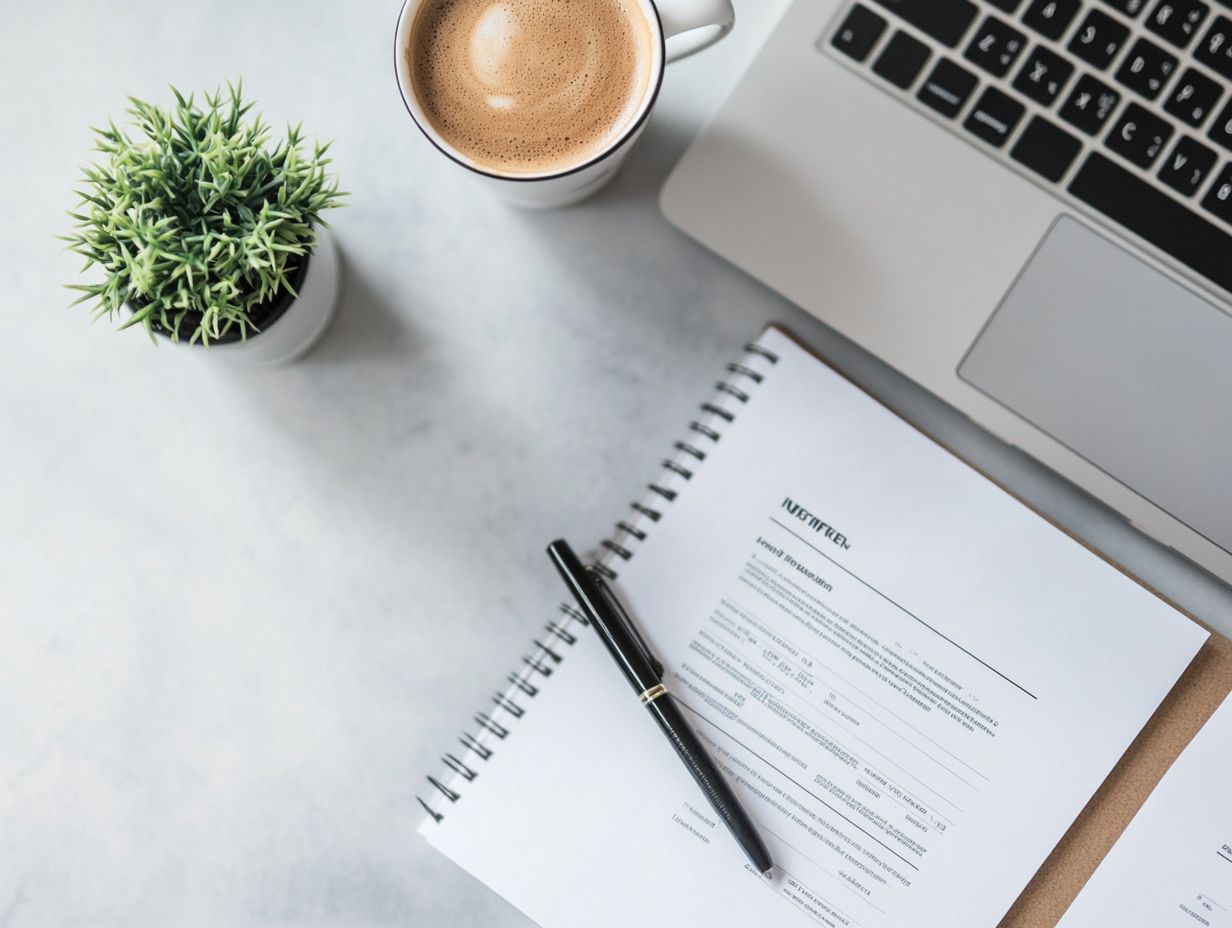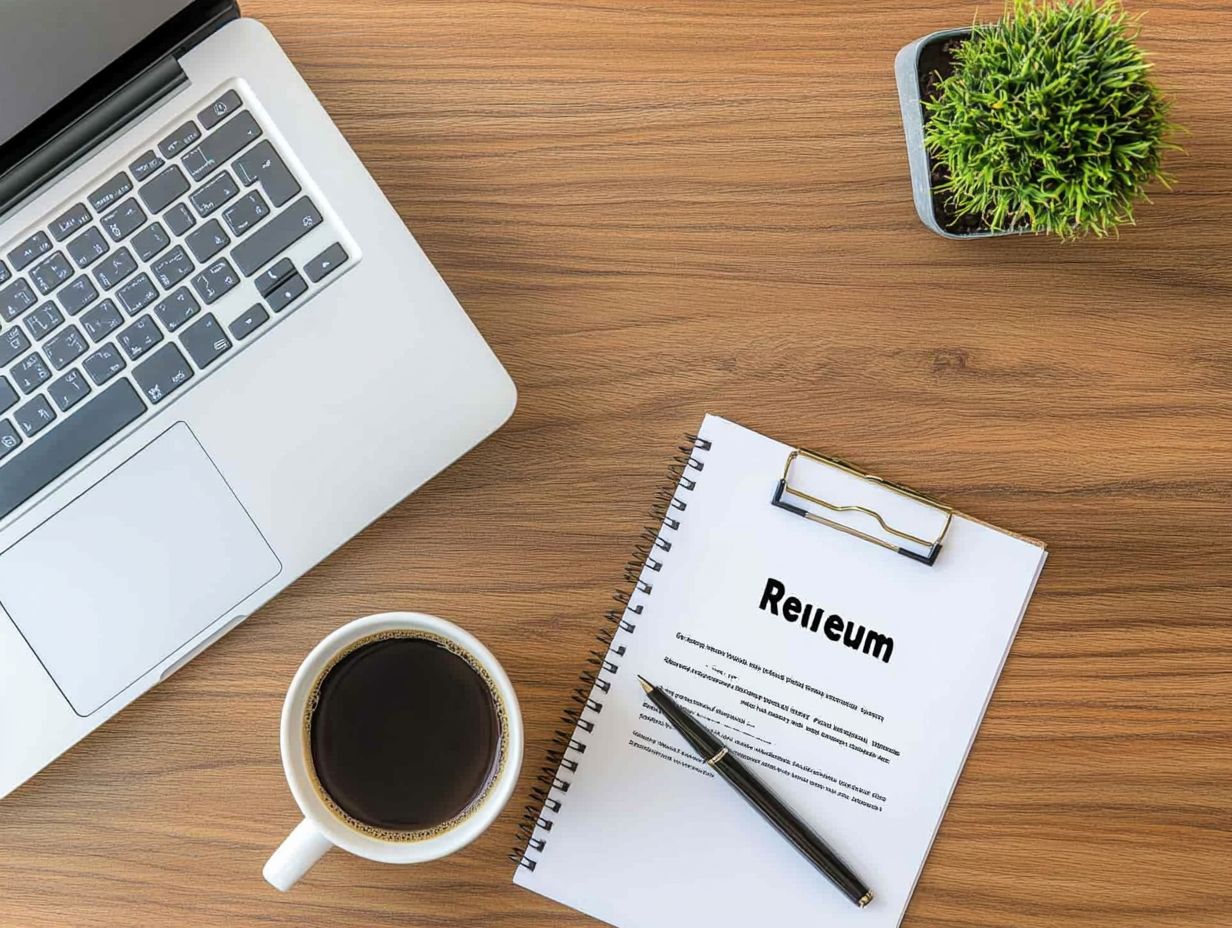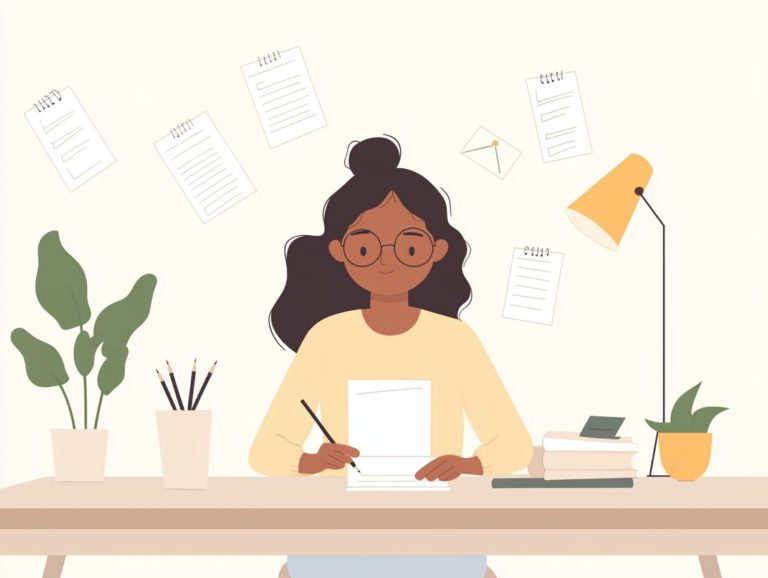How to Prepare for a Successful Interview
Preparing for a job interview can feel daunting. However, understanding the process can boost your confidence.
This guide covers essential steps, including types of interviews, common questions, and how to research your target company.
You ll discover effective strategies for answering questions and learn the importance of professional presentation. You ll also find tips for managing nerves and following up after the interview.
With the right preparation, you can make a lasting impression.
Contents
- Key Takeaways:
- Understanding the Interview Process
- Researching the Company and Position
- Preparing for Common Interview Questions
- Dressing and Presenting Professionally
- Practicing and Perfecting Your Interview Skills
- Handling Nerves and Staying Confident
- Following Up After the Interview
- Frequently Asked Questions
Key Takeaways:
- Understanding the interview process will help you prepare for success.
- Researching the company and position shows genuine interest and suitability.
- Practicing your interview skills will boost your confidence and professionalism.
Understanding the Interview Process
Understanding the interview process is essential for landing your ideal job. This experience unfolds in several stages, including preparation, the interview itself, and the crucial follow-up actions that can sway hiring decisions.
It s not just about showing your skills and achievements; it s also about projecting your professional presence and fitting into the company culture. By understanding these nuances, you can navigate the process, highlighting your strengths while addressing potential weaknesses.
This thorough approach paves the way for a successful interview experience.
Types of Interviews and Common Questions
Interviews can take various forms, including in-person, phone, and video interviews, each with its specific set of common questions that you should be ready for especially behavioral inquiries.
Understanding the differences among these types can help you tailor your responses. For instance, during a phone interview, you might face questions like, “Describe a time when you encountered a challenge at work,” while video interviews could present similar prompts and assess how you express yourself without words, like through body language. In-person interviews typically dive deeper, often featuring situational questions that explore how you would handle workplace dynamics.
Behavioral questions are particularly significant as they reveal how your past experiences resonate with the company’s culture and expectations. This helps employers assess not just your skills but also your values and work ethic.
Researching the Company and Position
Researching the company and the specific position you are applying for is a vital step in the job interview process. This preparation helps you clearly articulate how your skills align with the company’s culture and the expectations of the role.
Doing so demonstrates genuine interest and showcases your suitability for the position, setting you apart as a strong candidate.
Important Information to Gather
Before stepping into that interview, it’s essential to gather key information, including the company’s values, mission statement, and specific details from the job description that outline role expectations.
Make sure to look for the latest company news such as expansions, product launches, or awards that can provide valuable insights into the organization s current trajectory and priorities.
Understanding how the company is positioned within the industry is equally crucial, as it allows you to engage in discussions about competitors and market trends with confidence.
Knowing how your potential role contributes to the company’s broad goals enables you to present your achievements and skills in a way that aligns with the employer’s objectives, transforming your responses into compelling narratives during the interview.
Start preparing today to secure your dream job!
Preparing for Common Interview Questions

Preparing for common interview questions is essential for anyone looking to showcase their best selves during an interview. By employing strategies such as the STAR method (Situation, Task, Action, Result), you can craft well-structured responses that effectively highlight your strengths, weaknesses, and key achievements.
This approach not only enhances your clarity but also makes a lasting impression on your interviewers.
Tips and Strategies for Answering Effectively
Effective answering techniques can significantly elevate your performance in interviews! Employing the STAR method is among the most powerful strategies for addressing questions about your strengths and weaknesses.
This method prompts you to structure your responses by detailing the Situation, Task, Action, and Result. This creates a comprehensive narrative that highlights your key accomplishments. Engaging in mock interviews can be invaluable for building your confidence and refining your responses.
Practicing with a friend or mentor helps ensure your answers are clear and confident. It s crucial to align your experiences with the expectations of the role, demonstrating not just what you ve done but also how those achievements will translate into future success.
Maintaining a good appearance throughout this process will further reinforce your candidacy.
Dressing and Presenting Professionally
Dressing appropriately is essential for job interviews! This greatly affects the first impression you make and establishes your professional presence in the eyes of the interviewer.
What to Wear and How to Make a Good Impression
What you wear to an interview can greatly influence the first impression you create. It s crucial to dress appropriately while keeping the company’s culture in mind, projecting the image you want to convey.
In a workplace that allows casual but professional attire, choosing tailored chinos and a crisp button-up shirt is usually a smart move. Adding a sophisticated blazer can truly elevate your appearance. In more formal positions, you may need to wear a classic suit or a well-fitted dress that exudes confidence and professionalism.
However, it s not just about the clothes; grooming is equally important! Neat hair, polished shoes, and minimal accessories signal your attention to detail. Body language plays a significant role in conveying confidence maintaining eye contact shows engagement, while a firm handshake sets the tone for a positive interaction, leaving a lasting impression on the interviewer.
Practicing and Perfecting Your Interview Skills
Practicing and refining your interview skills through mock interviews serves as a powerful strategy to ensure you communicate with clarity and confidence.
Prepare well! It s your key to nailing that interview in a competitive landscape.
Mock Interviews

Engaging in mock interviews and conducting thorough self-evaluation are vital steps in refining your interviewing process and enhancing your overall interview skills.
These practices create a safe space for you to practice while providing the opportunity to receive invaluable feedback from peers, mentors, or professionals who can shed light on both your spoken and body language. By honing in on specific areas such as response clarity and confidence, you can significantly elevate your performance.
After each practice session, taking the time for a critical self-evaluation is key. It enables you to pinpoint your personal strengths and weaknesses. This commitment to continuous improvement not only ensures you re better prepared but also builds resilience, allowing you to adapt seamlessly to various interview scenarios in the future.
Handling Nerves and Staying Confident
Managing your nerves and showing confidence during job interviews is essential. Anxiety can undermine clear communication and significantly affect your overall performance. By focusing on techniques to stay composed, you can elevate your presence and make a lasting impression. You ve got this!
Techniques for Managing Anxiety and Nervousness
To alleviate anxiety and nervousness, you can employ various techniques that not only build your confidence but also help you maintain positive body language during the interview. This includes gestures, facial expressions, and posture that show your confidence.
One effective strategy is the Power Pose. The Power Pose is a strong stance that makes you feel more confident. By adopting expansive postures, you can significantly boost your self-assurance before stepping into the interview room. Good posture shows confidence. It also lifts your mood, setting the stage for a more engaging and assertive conversation.
Incorporating positive affirmations into your daily routine can further reinforce your self-belief, transforming any negative thoughts into enabling messages. Thorough preparation can dramatically diminish your nervousness, enabling you to articulate your strengths and experiences with clarity and poise.
Following Up After the Interview
Following up after the interview is a crucial step in the hiring process that showcases your professionalism and courtesy. A heartfelt thank-you note can make you memorable and reinforces your interest in the position, leaving a lasting positive impression on the interviewer.
Thank You Notes and Next Steps
Crafting a thoughtful thank-you note after your interview is an excellent way to reinforce your interest in the position while also inquiring about the next steps in the hiring process.
A well-structured thank-you note should include a brief expression of gratitude for the opportunity, a mention of something specific you discussed during the interview, and a reiteration of your enthusiasm for the role. For instance, you might acknowledge a shared vision for a project or comment on how the company s values align beautifully with your career aspirations.
Following up appropriately is equally crucial; it keeps the lines of communication open and showcases your professionalism. You can effectively convey your eagerness for the job offer by including a line about looking forward to contributing to the team s success. Don t wait! Send that thank-you note today!
Frequently Asked Questions

What are some tips for preparing for a successful interview?
- Research the company and position beforehand to gain a better understanding of the organization and its culture.
- Practice common interview questions with a friend or family member to improve your responses.
- Dress professionally and arrive early to make a good first impression.
- Bring copies of your resume and any relevant documents, such as a portfolio or work samples.
- Prepare questions to ask the interviewer to show your interest in the position and company.
- Take the time to review and understand the job description to align your skills and experiences with the requirements of the role.
What should I do the night before my interview?
- Lay out your outfit and make sure it is clean and professional.
- Research the company and review common interview questions.
- Get a good night’s rest to ensure you are well-rested and alert for the interview.
- Check the address and route to the interview location to avoid any potential delays.
- Eat a healthy meal and avoid consuming alcohol or any foods that may cause discomfort.
- Practice relaxation techniques, such as deep breathing, to calm nerves and reduce stress.
How important is body language during an interview?
- Body language can play a significant role in an interviewer’s perception of you.
- Maintain good posture and make eye contact to convey confidence and engagement.
- Avoid fidgeting or slouching, as it can make you appear disinterested or unprofessional.
- Use hand gestures to emphasize important points, but avoid excessive movement.
- Be aware of your facial expressions and try to smile and appear approachable.
- Pay attention to the interviewer’s body language and adjust accordingly to maintain a positive rapport.
What should I bring to the interview?
- Copies of your resume and important documents for reference.
- A notepad and pen for taking notes.
- Your identification and any required paperwork, like a completed job application.
- A portfolio, or collection of your best work examples, if applicable.
- A list of references, if the interviewer requests them.
- Questions you’ve prepared to ask the interviewer.
How can I stand out during an interview?
- Research the company and tailor your answers to fit their values.
- Highlight skills and experiences that make you a strong candidate.
- Ask thoughtful questions to show your interest in the role.
- Be genuine and let your personality shine through.
- Send a thank-you note after the interview to express your appreciation.
- Stay confident and maintain a positive attitude throughout.
What should I do if I feel nervous during an interview?
- Take deep breaths to relax your body and mind.
- Remind yourself of your qualifications and strengths.
- Focus on the conversation and listen actively to questions.
- Pause to gather your thoughts before answering.
- Use positive self-talk; feeling nervous is normal.
- Remember, the interviewer wants you to succeed!






